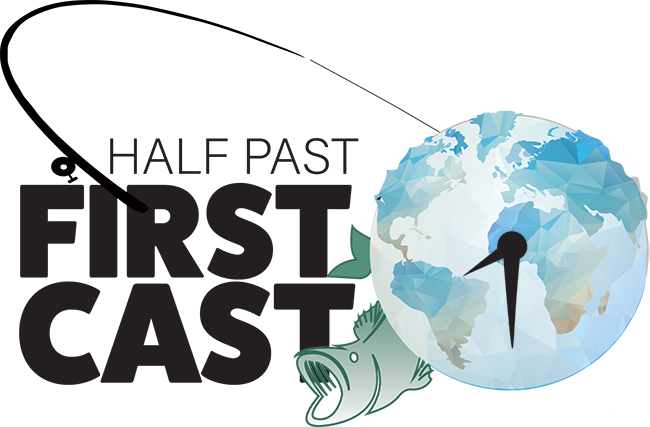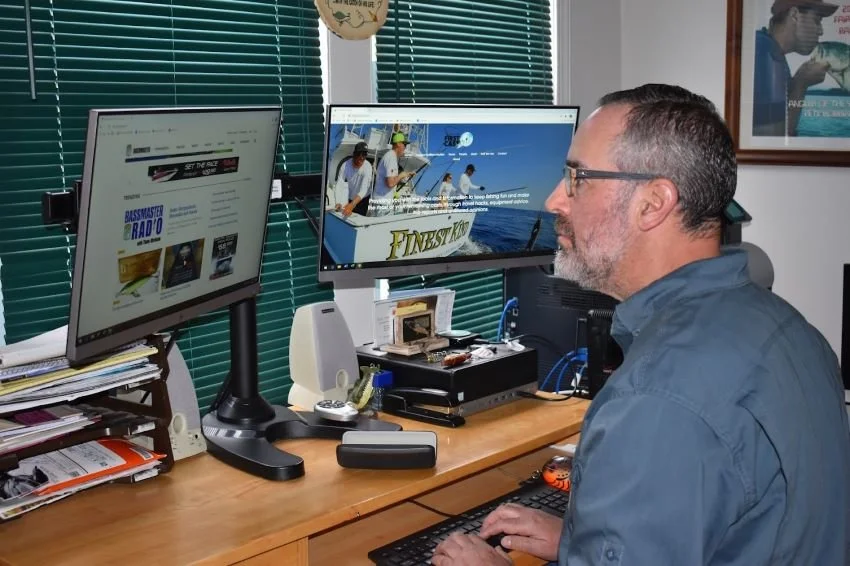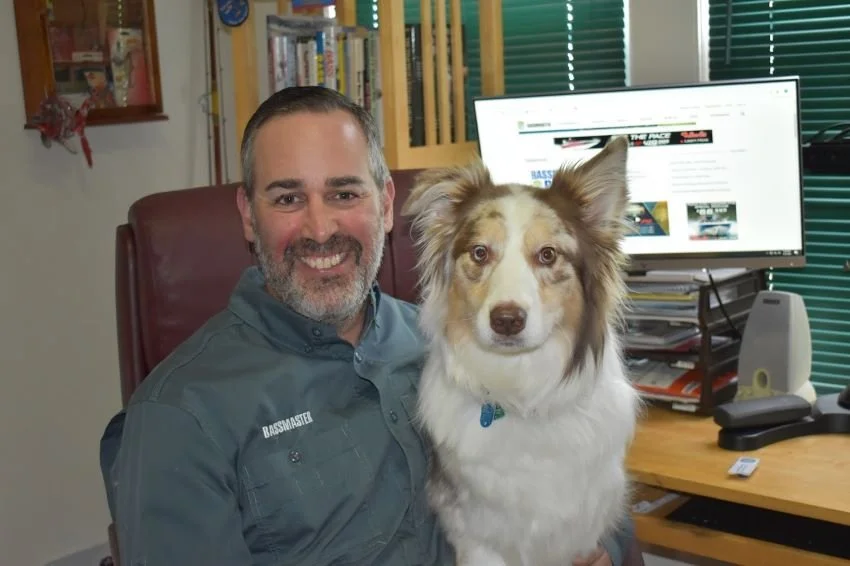Why Should You Start a Fishing Blog?
Half Past First Cast, this joint project with my lovely wife Hanna, is not my first entry in the world of fishing blogs. I started blogging at Yamamoto’s Inside Line under the trade name “Pete Weighs In” in late 2008, and I continue to write something for them weekly in that same space. As far as I know it’s one of the longest continuously-running blogging efforts in the fishing industry and I’m proud of that. I’m also thankful for the platform that the brass at Yamamoto initially gave me. I wanted to write about things that no one else was covering in the industry, and that didn’t fit neatly within the confines of existing magazines and websites.
Sometimes it was whimsical, sometimes it was controversial, and other times I took chances that failed. That was part of the learning process and thanks to Yamamoto’s huge platform it got me noticed by some important people. I’d already been writing for BASS for a while, but one day Jerry McKinnis read something I’d written on Inside Line and called to ask me to write more for him. Once in a while people flamed me on social media, but people were taking notice, and while our industry is still a tight-knit and cautious group, over time the chances that I took (even the abject failures) made me a better writer and generally more respected (if not necessarily) liked within the industry. If nothing else, it propelled my career forward in ways that would not have been possible without it.
So why am I suggesting that YOU start a blog? Well, I’m not necessarily doing so, but if you’re serious about increasing your footprint in some aspect of fish world, I am trying to put the general idea of documenting your efforts and experiences. There’s always room for more good content, particularly if it reflects a particular point of view. I also think that creativity in one field, even an unrelated field, causes you to open your mind in other beneficial ways.
What Is a Blog?
The word “blog” is short for “weblog,” but I don’t think I’ve ever heard anyone use the latter term. In layman’s terms, it’s a personalized diary-style web page. As far as I’m concerned, for purposes of this entry the definition could be more expansive than that. If you don’t like to write, then create a YouTube page – for example, I think Randy Blaukat’s videos effectively serve the same purpose as a written blog. If you’re a photographer, it could just be a “photo of the day,” or galleries of photos with captions and explanations. Don’t worry about strict definitions – just claim your place on the web. It could even be your social media feed, as long as you are consistently posting with a distinctive voice and for a discrete voice.
Who Needs a Fishing Blog?
Not everyone needs to document everything that they do, or even a fraction of their thoughts, but there are lots of people looking to stake even a small claim to space in the industry who should get started sooner rather than later:
Are you a writer who wants to build up a book of clips so that you can show editors proof of your abilities?
Are you a writer who already has plenty of outlets, but has the need to produce content that doesn’t fit within their parameters?
Are you an angler who would benefit from a unified place to journal your tournament efforts?
Are you an angler looking to get sponsors or promote sponsors?
Are you a company looking to promote a product?
All of the above groups, and many more, can benefit from creating their own fishing blog. The overhead is next to nothing, and you don’t need much technical ability. It can even serve as just a fishing log or ledger of personal accountability.
What I really like about it is that it’s on our own terms. We write about what we want, when we want, as often as we want, in whatever language we deem appropriate. That means that any negative fallout affects us directly, but so far it’s been mostly positive.
Hanna is not a natural writer, but she’s come a long way in just over three years of trying. More importantly, she’s developed a network of friends and contacts, increased her confidence, found people to go places like Anglers Inn Lake El Salto with us, and established her own persona (not just “Pete’s wife”) in the fishing industry.
Who Should Not Start a Fishing Blog?
Fortunately, everyone usually has a chance to reinvent themselves at least a couple of times, but don’t sling arrows if you’re not prepared to get slapped down. Again, ours is a timid and close-knit industry. If you start writing and criticizing anyone or anything you should be prepare to get shunned pretty quickly. There’s room for critical analysis, but unless you like being an outcast, it takes a while to earn that street cred.
You also shouldn’t blog if you’re not prepared to keep with it. The internet has a long memory, and there’s nothing that says “quitter” like a blog that started in May of 2019 with big ambitions that was last updated in June of 2019. You don’t need to post a 2,000 word screed every day of the year, but stay consistent. Underpromise and overdeliver – both to yourself and to your potential readers.
How to Set Up Your Fishing Blog
The web is increasingly accessible even to technophobes, and platforms like Squarespace, Wix and WordPress make it easy to get started in short order. Hanna and I paid an acquaintance who is much more web-savvy and design-savvy than us to get up our site, and she has remained a valuable resource when we’ve run into issues, but now we do most of the uploading and maintenance ourselves. We’re not producing something ultra-dynamic or cutting edge, but it serves our purposes.
When you’re starting off, think about your desired audience and write to them. I recently read that giving a speech without considering your audience is like “starting a love letter ‘To whom it may concern.’” The same holds true for your site. Are you looking for customers, or sponsors, or just to maximize your readership? Do you want local readers, domestic readers, international readers or all of the above? It makes a huge difference. We were utter novices when it came to SEO (search engine optimization) but we’ve taken a dive into it, and while it still sometimes seems like hocus pocus, overall our numbers and visibility continue to increase. If max clicks is your goal, recognize that it’s a slog, but done correctly (with good content) you’ll see some results.
Most importantly, have a voice. There’s something unique about your fishing experiences or your product that only you can comprehensively explain. Tell the story. Even better, define your blog narrowly (e.g., fishing travel, bass fishing in Florida, antique crankbait collecting) but don’t rule out the possibility of expansion.
If you’re having problems with creativity or inspiration, check out well-produced blogs (fishing or otherwise). Certainly don’t copy or plagiarize their ideas, but it never hurts to see which content resonates best and build upon that in your own unique way.
How to Work on Your Fishing Blog
As noted above, the key thing is to keep at it. Long temporal gaps defeat the purpose of an informal, diary-style website. Even if you’re just putting up a picture that means something to you, or linking to an article you read, keep it going. Semi-regular 200-word meaningful blurbs published several times a week keep things moving better than a 1,500 word article once a quarter – at least in this format.
Work to build community on social media, too, using whatever fora work best. I like Facebook and generally detest Instagram, so Hanna and I have split the labor accordingly. We’ve just dipped our toes into YouTube, not as a means of making money but rather as a holding pen for blog content, and we share that responsibility.
Don’t be afraid to change over time. If you started off writing about bass fishing in Florida, but for some reason see the need to expand to a wider variety of species, or to contract (e.g., all flipping in Florida, all the time) then follow where your instincts (and possibly the data) lead you. I look back at some of the content that we published on HPFC when we started in 2020, and it doesn’t really fit our purpose of getting people excited about fishing travel. It’s not necessarily “filler,” but it’s not the voice we wanted, either. Over time, we’ve refined that, and we may do so once or even several times in the future. Our goal is to share the thoughts and experiences that are uniquely ours, and to get people excited about the aspects of fishing (and even some non-fishing topics) that matter to us.
If you’re considering starting a fishing blog – or even if you’ve never considered it but think you might need a greater web presence – shoot us an email. We’re happy to share what we’ve learned. We’re also always looking for constructive criticism on how we can make this one more useful and more reader-friendly.







